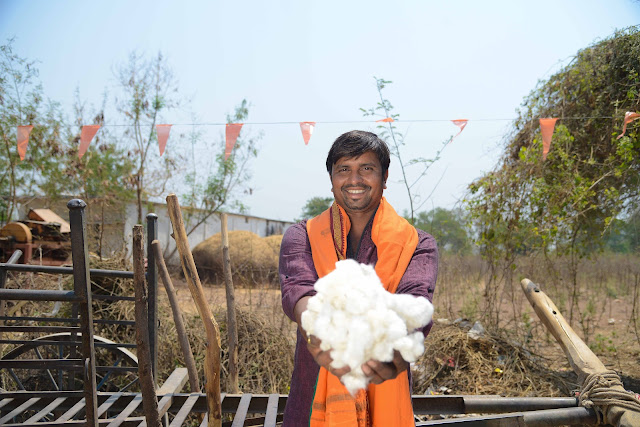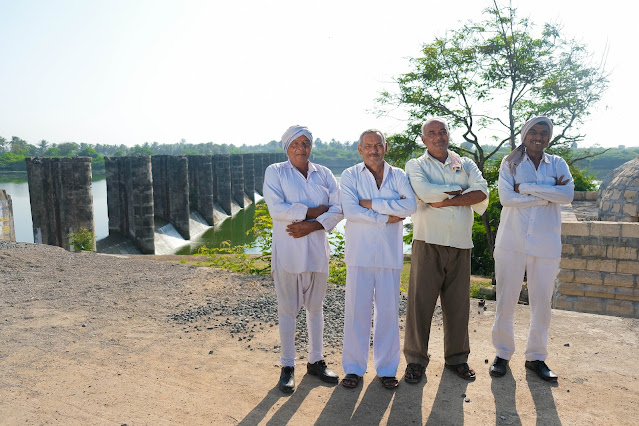PROSPERITY: True prosperity is a total picture, and includes health, joy, service, social status and material abundance. Prosperity involves feeling fulfilled and living a life of meaning, not just having a certain amount of monetary wealth.
Hansaben Jadhav of Kodinar, Gujarat considers herself very rich. Not only has she been able to double her income thanks to her dairy business and the support and guidance of Ambuja Cement Foundation, but she has gained a sense of purpose, fulfillment, dignity and community standing in the process. Once a housebound housewife, today she is the Director of the Bhagavati Mahila Milk Cooperative and a leader in the Sorath Women's Federation.
This in fact, is the true aim of Ambuja Cement Foundation. ACF's six thrust areas are centred around a very focused philosophy - to enable people, and enable prosperity - and by prosperity, we mean in every sense of the word.
"Ambuja Cement Foundation (ACF) was established in 1993 with a vision of bringing development and prosperity to the communities around Ambuja Cements Limited factories." said Pearl Tiwari, ACF's Director & CEO. "Our founder, Mr Narotam Sekhsaria was honest in his intentions and did not want to leave people behind - he wanted the people in the communities around us to prosper as the company prospered." Pearl said.
How do we achieve this? By strengthening livelihoods
"Whilst water, agriculture, skills, women, health and education are diverse programmes, they all converge with this one aim. For when a family's livelihood is strengthened, they have the means to solve and invest in their future - for their health, their children, their household and their community." Ms Tiwari said.
"We have found that the root of most community problems, lies in rural poverty. Whilst India has experienced economic growth over the last two decades lifting millions out of poverty, the lives of those who have exited extreme poverty is marked by a continuous struggle to achieve a basic level of dignity, comfort, and security." Ms Tiwari said. "It is this issue we aim to address."
"Unfortunately, the majority of rural India has been unable to partake in the great Indian success story, and a sense of deprivation and dissatisfaction prevails amongst the vast majority of the rural population. This is reflected in the widening urban-rural divide where the inequalities of consumption, quality of life, and availability of physical and social infrastructure are clearly evident." Pearl said.
"Looking back over the years, we have stayed true to our original vision, and today so many of our core villages have gone from floundering to flourishing as a result of increased livelihoods, profits and family prosperity," she said.
ENABLING: to make someone able to do something, or to make something possible.
Of equal importance however, is the need to empower people along the way, and build their capacity to play a key role in their own development. Whilst in the early days ACF started investing in basic infrastructure in partnership with local administrations, they quickly realised that true community development and prosperity would only come if people were empowered people to play a role in helping themselves.
"The social investments we make will only yield sustainable results if the community participates in the process. People feel empowered and a sense of well-being only when they have some control on the trajectory of their lives." Ms Tiwari said.
"The mission of the foundation has always been to enable people to participate in and manage the process of development, which in rural India is most often a very daunting task; complex social structures and dynamics of rural India pose a major barrier to any meaningful community participation.
"We realised early on that we had to create an enabling environment, where people understood the need for their involvement. Hence we prioritised community participation and building peoples' institutions from the get-go".
"Today, the people are at the heart and soul of everything we do at ACF and a crucial facet of our work is building local capacity and facilitating the establishment of 'people's institutions' which are manged by the local people. It is in this way that we are able to create long term, sustainable impact." Pearl said.
"ACF has facilitated over 2800 diverse Peoples Institutions such as Women's Federations, Farmer Producer Companies, Village Watershed committees, Water User Associations of farmers, each one of them now playing the leading role in bringing prosperity to their communities. Today these institutions are a driving force for change in our communities.
"This approach underpins all our work and our aim is to see people learn, grow, evolve and ultimately drive projects that solve community problems." she said.









0 Comment